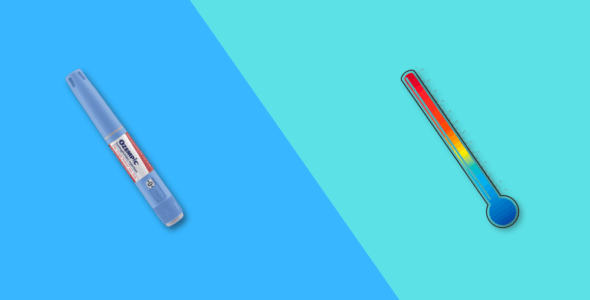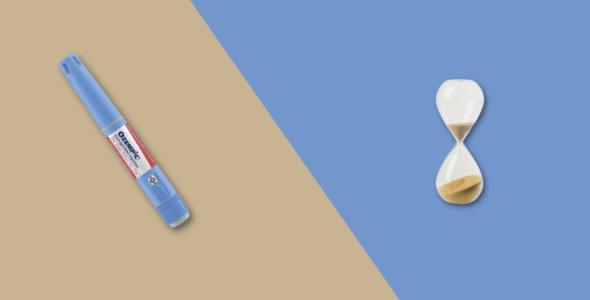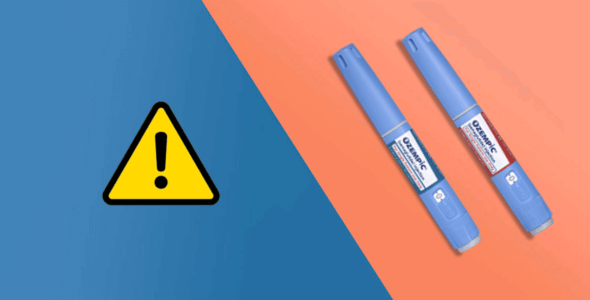Ozempic and constipation: Here’s what you can do
Key highlights
- Ozempic (semaglutide) is a glucagon-like peptide-1 (GLP-1) receptor agonist manufactured by Novo Nordisk to lower blood sugar levels in people with Type 2 diabetes.
- Constipation is a common side effect of Ozempic and other GLP-1 medications, such as Wegovy and Rybelsus.
- Constipation from Ozempic may last up to 6 weeks but can improve over time as the body adjusts.
- Increasing fluid intake, fiber, and exercise can help relieve constipation. Lowering the dose may also reduce symptoms.
- If lifestyle changes and over-the-counter laxatives or stool softeners don’t help relieve your constipation, consult a healthcare professional for further guidance and treatment options.
Ozempic (semaglutide) is an FDA-approved GLP-1 receptor agonist to treat type 2 diabetes and is also used off-label for weight loss in people with obesity and overweight.
One of the most common side effects of Ozempic is constipation, which can make you feel bloated, gassy, and uncomfortable. This happens when stool moves too slowly through the bowels, causing strained bowel movements. While frustrating, there are ways to manage this side effect and still benefit from Ozempic.
Keep reading to learn how common it is, why it happens, and how to treat Ozempic-related constipation.
Does Ozempic cause constipation?
Yes, Ozempic can cause constipation. It can make bowel movements slower, leading to discomfort and bloating. An estimated 3% to 5% of people experience constipation while using Ozempic.
A more recent study has shown that 4% to 12% of people taking Ozempic experience constipation. Another study shows that this rate may be even higher for those using Ozempic for off-label uses.
However, the good news is that constipation happens less often than other common side effects of Ozempic, such as nausea, vomiting, diarrhea, heartburn, and stomach pain.
Only about 4% of people with gastrointestinal-related side effects choose to stop taking Ozempic. While this comes from just one study, it shows that the side effects can be frustrating but are usually not severe enough to stop the medication.
How long does constipation last when taking Ozempic?
Constipation from Ozempic can last about 6 weeks but usually goes away on its own as your body adjusts to the drug. However, not much research is available, so some people may feel better sooner, while others may take longer to find relief.
Constipation may also occur more often with higher doses of Ozempic and could return if the dose is increased by your healthcare provider. If it continues or becomes bothersome, it is important to consult your doctor.
How to get relief from Ozempic constipation
Constipation from Ozempic can leave you feeling bloated, gassy, and uncomfortable. To find relief, you can try simple lifestyle changes, Over-the-counter (OTC) laxatives, or stool softeners can help but it is important to consult your doctor before using them. If constipation persists, talk to your doctor for further guidance.
Lifestyle changes
- Increase fluid intake: Staying well-hydrated can help alleviate constipation and support your overall health. Make sure you drink plenty of water each day. For most people, this is around 91 oz to 125 oz, which equals about 11 to 15.5 cups.
- Increase fiber intake: Add more fiber-rich foods to your diet, such as fruits, vegetables, legumes, and whole grains. Start by including two extra servings each day to help support digestion and relieve constipation.
- Increase exercise: Try to get 10 to 20 minutes of physical activity each day, such as walking or any exercise you enjoy. Regular movement helps stimulate your digestive system and can improve gut health, helping to relieve constipation.
- Start Ozempic at a lower dose: Clinical studies suggest that constipation is more common with higher doses of semaglutide. Starting at a lower dose and gradually increasing it can help your body adjust and may reduce the risk of constipation.
Laxatives and stool softeners
OTC laxatives and stool softeners can provide quick relief from constipation but should not be used long-term, as they can cause dependency and worsen constipation. Stop using them after a bowel movement and avoid taking them for more than a week.
Short-term options include laxatives and stool softeners available without a prescription including:
- Senna (Sennosides): This works by stimulating the nerve endings in your colon muscles, causing them to contract and move stool through your digestive system to relieve constipation.
- Dulcolax (Bisacodyl): A laxative that works by stimulating the muscles in your intestines, helping to move stool through your digestive system and ease bowel movements.
- Miralax (Polyethylene glycol): A laxative that helps draw water into your stool, which softens it and makes it easier to pass.
- Colace (Docusate sodium): A stool softener that helps your gut absorb more water, which makes the stool softer and easier to pass, relieving constipation.
If you are unsure about using a laxative or stool softener, consult your healthcare provider or pharmacist. If your symptoms worsen after starting these medications, seek medical attention immediately, especially if you experience vomiting or severe stomach pain.
Prescription medications for constipation
If constipation does not improve with lifestyle changes or over-the-counter solutions, it might be more severe. In such cases, your doctor may prescribe stronger medications such as:
- Linzess (Linaclotide): A medication that helps speed up the movement of food through your intestines, easing bowel movements.
- Cholac (Lactulose): A laxative that works by drawing water into the colon, which helps soften hard, dry stools, making them easier to pass.
- Amitiza (Lubiprostone): This laxative works by increasing fluid in the gut, which helps soften stools and makes them easier to pass.
- Motegrity (Prucalopride): It works by stimulating specific receptors in the gut, which helps increase bowel movements and relieve constipation.
If you are prescribed laxatives, talk to your doctor about potential risks and drug interactions. Long-term use can lead to dehydration, dependence, and other digestive issues like bloating and abdominal pain.
Natural remedies
Certain non-medical methods can encourage a dormant gut to relieve you of constipation:
- Herbal teas: Herbal teas like peppermint, ginger, and chamomile can help soothe your digestive system and relieve constipation. These teas promote relaxation and stimulate bowel movements, offering a natural way to ease discomfort.
- Probiotics: Probiotics are beneficial bacteria that can help improve gut health and relieve constipation. Taking probiotics regularly can promote better digestion, support regular bowel movements, and restore balance to the gut microbiome, easing constipation over time.
- Prebiotic foods: Prebiotic foods like bananas, onions, garlic, and whole grains, help feed the good bacteria in your gut. These foods support healthy digestion and can help relieve constipation by promoting regular bowel movements.
- Prunes: Prunes are rich in fiber which helps soften stool and relieve constipation. Eating prunes or drinking prune juice can promote regular bowel movements.
- Olive oil: This acts as a lubricant, making it easier for stool to pass through the gut and softening the stool for smoother bowel movements. Consuming a teaspoon of olive oil on an empty stomach in the morning can help ease constipation.
- Ginger: Ginger helps relieve constipation by reducing pressure on the lower intestines. It also eases symptoms like cramping, bloating, and nausea, making it a useful natural remedy.
These remedies can help improve digestion and relieve constipation naturally, but if symptoms persist, it is important to consult a healthcare provider.
Speak with a healthcare professional
If you are experiencing constipation while taking Ozempic, talk to your healthcare provider. They may adjust your dosage to help with the issue.
Other medications you take might also be contributing to constipation. Don’t stop any medications without consulting your doctor, as they can adjust them or suggest alternatives.
While rare, Ozempic can cause serious side effects like hypoglycemia (low blood sugar), pancreatitis, gallbladder problems (gallstones), and vision changes.
This weight loss drug also has a black box warning from the FDA for the risk of thyroid cancer.
What causes Ozempic constipation?
It isn’t clear why Ozempic causes constipation. However, research shows that it likely has to do with how Ozempic affects the gut.
Semaglutide, the active ingredient in Ozempic, slows stomach emptying, helping you feel full longer and avoid blood sugar spikes. This can also cause constipation, as it reduces water intake and makes stools drier and harder to pass.
Additionally, feeling full may lead to eating less, which can result in not getting enough fiber. Fiber is essential for softening stools and making them easier to pass, so a lack of it can further contribute to constipation.
Less fluids being consumed
Ozempic slows stomach emptying, making you feel full longer and eat less. However, this can also reduce your fluid intake, leading to dehydration. This lack of fluids in the body can make stool hard and more difficult to pass.
Less fiber being consumed
Ozempic can cause constipation by reducing the amount of fiber you consume. Since the medication makes you feel fuller for longer, you may eat less food, leading to a lower fiber intake. Without enough fiber, stool becomes harder to pass, contributing to constipation. Not consuming enough fiber is known to be the leading cause of constipation.
Slower gastric emptying
Slower gastric emptying (stomach paralysis), a common effect of Ozempic, can contribute to constipation. The medication slows down how quickly food moves through the digestive tract, which can lead to feelings of fullness and reduced fluid and fiber intake resulting in harder stools.
Insulin sensitivity
Ozempic helps the body produce more insulin, which is great for controlling blood sugar but can slow down digestion. This slower gut movement (gastroparesis) can lead to an increased risk for less frequent and harder stools.
Symptoms of constipation while taking Ozempic
The most common symptoms of constipation are as follows:
- Infrequent or difficult bowel movements
- Hard, dry stools or difficulty passing stools
- Associated bloating, discomfort, or abdominal pain
If these symptoms persist, it is important to talk to your doctor for medical advice.
How common is constipation with Ozempic?
In Ozempic clinical trials for type 2 diabetes, constipation was reported by 3-5% of participants. However, research shows that constipation may be more common when Ozempic is used for weight management.
Another study found that 24.2% of participants experienced constipation as a side effect vs. 11.1 % of participants taking a placebo.
Additionally, the dosage of Ozempic plays a role in how often gastrointestinal side effects like constipation occur. Higher doses of semaglutide can have a greater impact on stomach function, leading to other possible side effects such as nausea, or diarrhea.
Frequently asked questions
Does constipation cause weight gain?
Constipation does not directly cause weight gain, but it can make you feel bloated and uncomfortable, which may give the impression of gaining weight. This happens because stool builds up in your intestines, causing a temporary increase in body weight due to the extra waste.
Can adjusting the dose reduce constipation?
Yes, adjusting the dose of Ozempic can help reduce constipation in some cases. If you experience constipation, your doctor might suggest lowering the dose to see if it helps improve the symptoms.
Are there specific foods to avoid while taking Ozempic?
There are no specific foods you must avoid while taking Ozempic, but it is best to eat a balanced diet with plenty of fiber to help prevent constipation. You should also avoid overeating or eating greasy and fatty foods, foods that are high in sugar, ultra-processed carbohydrates (white bread or white rice), and alcohol as they can make side effects like nausea or stomach discomfort worse.
Bottom line
Ozempic can cause constipation in some people, affecting about 4% of users in clinical studies.
Ozempic-related constipation is manageable through hydration, fiber-rich foods, and over-the-counter stool softeners or laxatives.
It is important to consult with your healthcare provider to find personalized solutions for managing Ozempic-induced constipation, as they can help adjust your dosage or recommend the most effective treatments for your specific needs.











